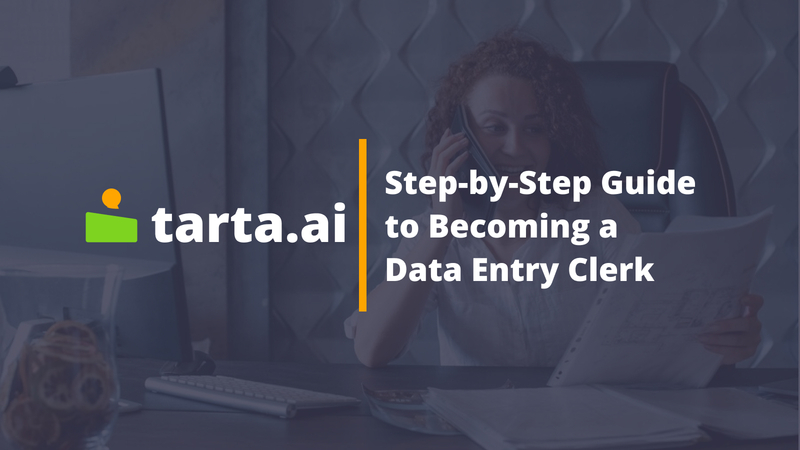Step-by-Step Guide to Becoming a Data Entry Clerk

Data entry clerks are responsible for inputting, updating, and maintaining accurate records in various computer systems. Although the job may seem straightforward, data entry clerks need to have strong computer skills, typing speed and accuracy, and an eye for detail. In this step-by-step guide, we will outline the key steps to becoming a data entry clerk.
Step 1: Develop Basic Computer Skills
The first step in becoming a data entry clerk is to develop basic computer skills. This includes proficiency in operating systems like Windows or macOS, familiarity with Microsoft Office applications like Excel, Word, and PowerPoint, and knowledge of internet browsers. If you need to improve your computer skills, there are many online resources available to help you.
Step 2: Build Typing Speed and Accuracy
Data entry clerks need to be fast and accurate typists to complete their work efficiently. To improve your typing skills, practice typing exercises regularly. There are many online resources that offer typing tests and games to help you increase your speed and accuracy.
Step 3: Learn Data Entry Software and Tools
Many data entry jobs require the use of specific software and tools to input data into databases, spreadsheets, or other systems. It is important to learn how to use these tools and become proficient in their use. Some of the commonly used data entry software and tools include Microsoft Excel, Access, Google Sheets, and QuickBooks.
Step 4: Gain Experience through Internships or Entry-Level Jobs
Gaining experience through internships or entry-level jobs is essential to landing a data entry clerk job. These positions provide the opportunity to learn and develop skills necessary for the job. Some entry-level jobs that provide experience in data entry include administrative assistant, receptionist, or customer service representative.
Step 5: Polish Your Resume and Cover Letter
A well-crafted resume and cover letter can make a significant difference in getting noticed by potential employers. Be sure to highlight your computer skills, typing speed and accuracy, and experience with data entry software and tools. Employers look for attention to detail, accuracy, and organization in a data entry clerk candidate.
Step 6: Apply for Data Entry Clerk Jobs
There are many places to look for data entry clerk job openings, including job search engines, company websites, and recruitment agencies. When applying, make sure to tailor your application to each job and company, highlighting relevant skills and experience.
Step 7: Ace the Interview and Get the Job
After submitting your application, the next step is to prepare for the interview. Research the company and practice common interview questions for data entry clerk positions. Employers typically look for candidates who can work efficiently, prioritize tasks, and have a strong attention to detail.

Photo: katemangostar/Freepik
In conclusion, becoming a data entry clerk requires basic computer skills, strong typing speed and accuracy, and experience with data entry software and tools. Gaining experience through internships or entry-level jobs is important to develop the necessary skills for the job. With a well-crafted resume and cover letter, applying for data entry clerk jobs becomes easier. Lastly, preparing for the interview is crucial to impressing potential employers and getting the job. By following these steps, you can become a successful data entry clerk.
- The first step is to develop basic computer skills, followed by building typing speed and accuracy.
- Learning data entry software and tools is also important, as is gaining experience through internships or entry-level jobs.
- Polishing your resume and cover letter is crucial, and job seekers should apply for data entry clerk jobs by tailoring their applications to each job and company.
- Finally, preparing for the interview is key to impressing potential employers and getting the job.
FAQ
What industries typically employ Data Entry Clerks?
Data Entry Clerks can be employed in a variety of industries, including healthcare, finance, government, retail, education, and more. Any industry that requires the collection, storage, and analysis of data is likely to employ Data Entry Clerks.
What is the salary range for a Data Entry Clerk?
The salary range for a Data Entry Clerk varies depending on the location, industry, and experience level. On average, a Data Entry Clerk can earn between $24,000 to $48,000 per year.
What qualifications are required to become a Data Entry Clerk?
Most employers require a high school diploma or equivalent, and basic computer skills. Some positions may require previous experience in data entry or related fields. Proficiency in typing and basic knowledge of computer applications, such as Microsoft Office or Google Suite, may also be required.
What are the working hours for a Data Entry Clerk?
Data Entry Clerks typically work full-time hours, although part-time and flexible schedules may be available. They may work in shifts and overtime may be required to meet deadlines.